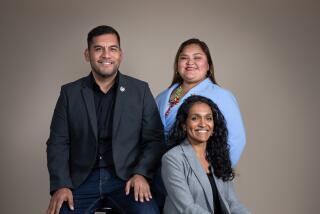Race spotlights clash over West Hollywood’s future
- Share via
Many people in West Hollywood saw the recent battle for three open City Council seats as a cultural clash over the spirit of the city.
Seven challengers, all gay men, accused the incumbents of pushing mega-developments and gentrification and straying from the city’s roots as the nation’s leading bastion of gay rights and gay representation.
On Wednesday, about 800 provisional ballots remained to be counted in Tuesday’s election and West Hollywood City Clerk Tom West said the official results would be announced Monday.
But preliminary results showed two incumbents left standing — John Heilman and Abbe Land, who were instrumental in the city’s founding.
Gone, it appears, is Lindsey Horvath, a 28-year-old advertising executive who had lived in West Hollywood for less than two years in 2009, when she was appointed to the council to replace a member who died.
Horvath’s seat appears to have been filled by former Planning Commissioner John D’Amico, a 47-year-old architect and longtime gay activist who has promised to curtail what he calls the “Los Angeles-ization of West Hollywood.”
In an interview Wednesday, D’Amico said he wanted to scale down the city’s 20-year master plan, which is up for revision, and rein in large-scale developments.
He characterized one, a proposed mixed-use project that could bring nearly 300 market-rate condominiums to a stretch of Santa Monica Boulevard, as a place that might not be affordable to younger residents and those with low incomes.
West Hollywood was founded on the idea that it could be a place for everyone, D’Amico said. “But the idea that produced West Hollywood has disappeared. We haven’t asked a new generation of men and women to move here and be a part of the narrative.”
Councilman John Duran, a friend of D’Amico since they met as AIDS activists in the early 1990s, said other council decisions in recent years — including a ban on smoking in outdoor dining areas — suggested that city leaders wanted to “sanitize us, to scrub us clean.”
“But we’re not that. We’re the Sunset Strip, we’re Boys Town, we’re this leftist bohemian enclave,” Duran, 51, said. “We were losing our grittiness, our edginess. This election was about reclaiming that.”
Some voters and some of his colleagues on the council say those assertions are exaggerated.
“I don’t think I would consider this a dramatic shift in our city,” said Heilman, 53.
He said there have always been competing visions of what development in West Hollywood should look like — and whom it should be for.
“Tension has existed in the city for a long time,” he said. “The time for electioneering is over. It’s time to move forward.”
While campaigning for his eighth term in office, Heilman told voters that West Hollywood had come a long way since 1984, when it was incorporated as a city.
The city’s annual budget has grown six-fold, to about $80 million. It offers generous services to its residents, has an excellent credit rating and has been a leader on many progressive social issues.
It was a desire for strict rent controls that galvanized the voters to push for local control 26 years ago.
But it was West Hollywood’s reputation as America’s first openly gay city that caught the nation’s attention. The mayor and most of the City Council members were gay, as were a third of the city’s residents.
Heilman said his challengers were mistaken in charging that the city was losing its identity. A recent study, he said, showed that 40% of the city’s residents are gay or lesbian.
Ivy Bottini, an 84-year-old feminist who has lived in West Hollywood since 1999, said she believes that West Hollywood has maintained its stance as “a city of equality.”
“We live together, all these different social groups,” she said. “We have a large lesbian and gay population, a large Russian population and many seniors.”
She said she voted for all of the incumbents on the ballot, including Heilman, because she thinks they have done a good job.
“I’m not in love with big, tall buildings,” she said of the development, “but I do think some of it is inevitable. What’s important is that the people love it here. It’s a wonderful place to live.”
Last year, Bottini starred in a local theater production, a play that chronicled the founding of the city.
It was called “Making Paradise: The West Hollywood Musical.”
More to Read
Sign up for Essential California
The most important California stories and recommendations in your inbox every morning.
You may occasionally receive promotional content from the Los Angeles Times.














